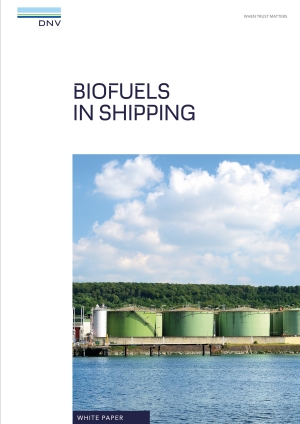


(Posted on 05/06/23)
DNV's latest white paper “Biofuels in shipping” finds that the flexibility of biofuels can enable the shipping industry to accelerate its journey towards decarbonization while maintaining operational efficiency. Current limitations in production capacity, however, may impact short-term supply and create stiff competition with other sectors.
With the shipping industry getting ready to meet decarbonization requirements, the use of biofuels is on the rise. The current global production capacity of sustainable biofuels is around 11 million tonnes of oil equivalent (Mtoe) per year. DNV predicts that a sustainable and economically viable supply of biofuels, ranging from 500 to 1300 Mtoe annually, can be achieved by 2050. However, to fully decarbonize shipping using biofuels, in combination with energy efficiency measures, an annual supply of 250 Mtoe of sustainable biofuels is required by 2050. This would represent 20-50% of potential global production.
“Biofuels are poised to play a notable role in the decarbonization of shipping. Nevertheless, existing constraints on production capacity and competition from other sectors is likely to impact short-term supply to the maritime industry,” said Eirik Ovrum, Principal Consultant in DNV Environment Advisor, “A major build-up of sustainable production capacity is needed before biofuels can reach their full potential and thus shipping’s goal of decarbonizing will need to be achieved in combination with energy efficiency measures as well as use of other low carbon fuels alternatives.”
Regulatory developments, such as The EU Emissions Trading System (EU ETS), present a strong incentive for embracing biofuels, making both biofuels and biomass highly sought after by various sectors as they strive for decarbonization. These resources are also currently being used in cooking, water and space heating, as well as timber and pulp and paper production posing some challenges to production capacity and availability.
The white paper takes a closer look at these challenges by shedding light on the potential role of biofuels in enabling the decarbonization of shipping, while also offering practical advice on the necessary preparations before integrating biofuels onboard vessels.
Columbia Group anticipates a period of strong expansion as an increasing number of international shipowners... Read more
Norse?Ship Management has expanded its use of Smart Ship Hub’s high frequency sensor data and... Read more
As the maritime industry gears up to welcome the IMO’s STCW bullying and harassment training amendments... Read more
NORDEN has acquired the cargo activities of Taylor Maritime in Southern Africa (previously operated... Read more
Philippos Ioulianou, Managing Director of EmissionLink, has warned the IMO’s decision to delay... Read more
VIKAND has highlighted the need for cultural change in the maritime sector as reports of bullying, harassment... Read more
The maritime industry is experiencing a period of significant transformation, driven by rapidly evolving... Read more
NorthStandard has advised Members of a 5% increase in P&I premiums for the marine insurance year... Read more
Anemoi Marine Technologies, the UK-based leading designer of Rotor Sails for wind-assisted ship propulsion... Read more
Helm Operations has announced that nine electronic record books within Helm CONNECT Logbook have been... Read more